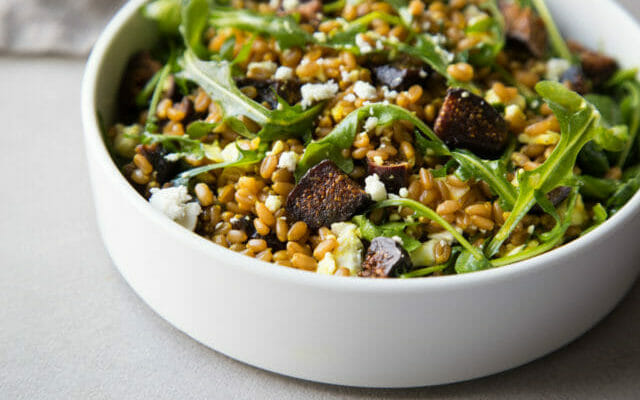Intuitive Eating: A Non Diet Path to Wellness

According to some of the statistics I’ve read, nearly a quarter of us will launch into a diet as part of a New Year’s resolution this month. Sadly, most of our best-laid plans will end in failure (and finding refuge in a cookie jar). It’s plainly depressing and I’d like to propose a different kind of diet for 2018. Actually, it’s not a diet at all. It’s Intuitive Eating, a non-diet approach to wellness that is espoused by some of my favorite nutrition experts and registered dietitians. Top among them is Rachael Hartley, a private practice dietitian who blogs at The Joy of Eating. Rachael has seen first hand how transformative it can be to build a healthier relationship with food. Below she shares her insight and expertise on Intuitive Eating.
Intuitive Eating, By Rachael Hartley
So, you might be wondering why a DIETitian is so committed to a non-diet practice? After all, most of what we hear about healthy eating is sold under the context of dieting.
When I first became a dietitian, I practiced in a really conventional way. I taught calorie counting, portion control, the food guide pyramid – the whole dieting shebang! Oye.
It quickly became apparent that teaching people to diet wasn’t helping anyone. Some clients lost weight initially, then gained it all back (and often more). Others made seemingly healthy changes, yet the scale didn’t budge, so they went back to the way they were eating. Still others felt completely overwhelmed and didn’t make any changes at all. Can’t blame them! I wouldn’t be willing to count calories for the rest of my life either.
In my six years of nutrition education, we never covered the harm that dieting can cause. Did you know that 95-97% of diets fail within 1-5 years, and of those failed diets, approximately 60% regain more weight than they lost in the first place? If you’ve spent most your life yo-yo dieting, know that it has nothing to do with your willpower and more to do with biology. Dieting slows metabolism and increases hunger hormones as the body goes into “starvation” mode. Dieting has also been linked to depression, anxiety, and low self esteem. It’s also the most common trigger of eating disorders and disordered eating in genetically susceptible people.
Thankfully, with my background in psychology, I stumbled upon and quickly connected with mindful eating, intuitive eating and other non-diet approaches. I saw that by shifting the focus away from the scale, and onto thoughts and behaviors, clients were able to make sustainable lifestyle changes to improve their health. By wasting less time stressing about food, they had room for more important things in life, like family.
So, what is this life-changing intuitive eating I speak of? Intuitive eating is a practice based on 10 principles, which you can read here. They’re not rules, but rather guidelines to help you make peace with food, and view nutrition and fitness as self care, not a form of punishment. Here’s how I like to distinguish dieting and Intuitive Eating:
1. Listen to internal cues vs external cues.
Intuitive eaters listen to internal cues, like hunger, fullness, and cravings, to make food choices. Dieters listen to external rules (i.e. diet rules) telling them what and how much they should eat. We’re all born with the innate ability to balance out food choices and eat the right amount of food to fuel our body over time. You may have noticed this with your kids, who may eat a lot of food at one meal, and very little the next. Over time, it balances out. Intuitive eating teaches you to tap back into those internal cues to guide decision making, because your body knows better than any diet what’s best for YOU.
2. No food is off limits.
With intuitive eating, all foods are on the table. That might feel really scary at first, like you’ll loose control and overeat. But in actuality, placing a food off-limits creates forbidden fruit, and people who are dieting usually eat more of the foods that they’re trying to restrict. With intuitive eating, there’s often a “honeymoon phase” where you’re eating more of those foods you used to restrict, but eventually they lose their appeal.
3. The focus is on behaviors, not the scale.
For all that’s been drilled in our head about BMI and obesity and health, there’s no way to accurately predict what your healthiest weight is. Weight doesn’t determine health – that’s determined by a combination of genetics, environment, and lifestyle. Instead of trying to control the scale, which fails 95-97%, why not focus on building health-promoting habits, and let your body settle at it’s healthiest size.
4. Nutrition and fitness are a form of self care.
Instead of pounding away at the gym in an attempt to burn as many calories as possible, move your body for fun and to relieve stress, perhaps with a relaxing yoga class, a heart-pumping dance party in the basement with your kids, or a long walk outside with the dogs to decompress after work. Start thinking of food as fuel, and a source of pleasure! Instead of forcing yourself to eat a bland salad, pack a balanced, tasty and nutritious lunch, that also provides you with the energy you need to get through the rest of the day.
A lot of my clients who are new to Intuitive Eating think it’s too good to be true, but research shows intuitive eaters have better diet quality and less weight cycling (i.e. yo-yo’ing) than dieters. It’s been associated with a reduced risk of chronic disease and better wellbeing. Basically, research shows that although you might think without rules and restrictions, you’ll get out of control with eating, quite the opposite happens.






Comments
01.03.2018 at6:48 AM #
Betsy
Katie, this is amazingly helpful. Thank you!
01.03.2018 at8:02 AM #
Trishoro
Can’t wait to change over eating